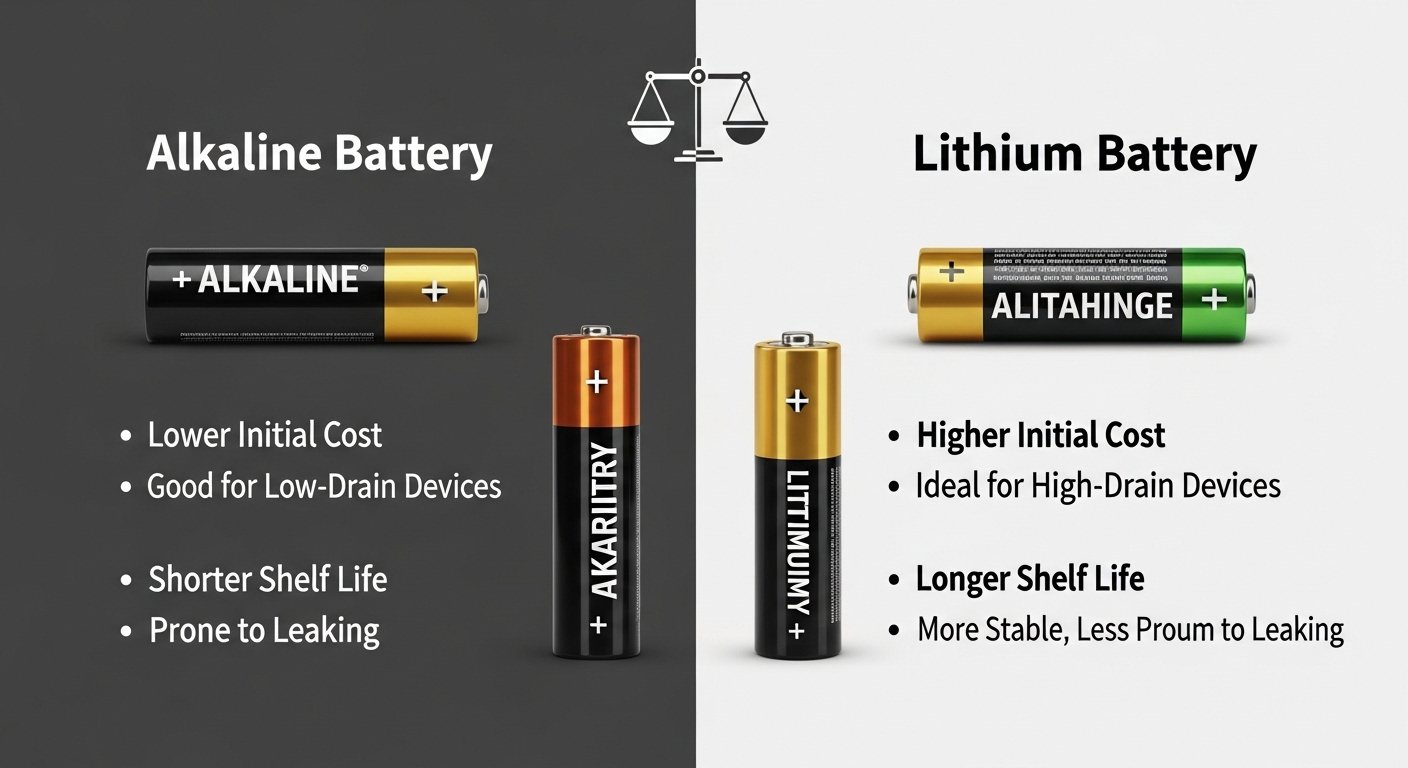Technology
Alkaline vs Lithium Batteries: Which One Should You Choose for Your Devices?

When it comes to powering our everyday gadgets—whether it’s a TV remote, a camera, or a high-performance device—understanding the difference between alkaline vs lithium batteries can help you make smarter buying decisions. Both battery types are widely available and serve similar purposes, but their performance, cost, and longevity differ significantly. Additionally, if you’re looking for long-term, eco-friendly options, rechargeable lithium batteries might be the best choice to power your devices efficiently.
Understanding Lithium Batteries
Lithium batteries, especially lithium-ion (Li-ion) and lithium-polymer types, are known for their high energy density and rechargeability. Unlike traditional disposable batteries, these can be charged and used multiple times, making them ideal for modern electronics such as laptops, smartphones, and electric vehicles.
Key Advantages of Lithium Batteries
- Rechargeable and long-lasting: Lithium-ion batteries can be recharged hundreds of times, offering excellent value over their lifespan.
- High energy density: They deliver a large amount of power in a small and lightweight design—perfect for portable devices.
- Consistent performance: Lithium batteries maintain a steady voltage output throughout most of their discharge cycle.
- Lightweight: Their compact size and light weight make them perfect for devices where mobility matters.
At Besomi, you can find reliable rechargeable lithium batteries for various applications. For example, the Li-ion Battery, 3.7V, 2500mAh – High-Capacity Rechargeable Cell (Panasonic) is available for AED 18, and the PL-724957 Rechargeable Lithium Polymer Battery, 3.7V, 150mAh is priced at AED 25. These high-quality batteries are great for powering cameras, robotics kits, and other DIY electronics projects.
Disadvantages of Lithium Batteries
- Higher cost: Lithium batteries tend to be more expensive upfront than alkaline options.
- Safety risks: They can overheat or catch fire if damaged or overcharged—a condition known as thermal runaway.
- Limited lifespan: Over time, lithium batteries lose capacity even when not in use.
- Environmental impact: Mining lithium and other materials like cobalt can harm the environment if not managed responsibly.
Understanding Alkaline Batteries
Alkaline batteries are the most common disposable batteries used in household items such as clocks, flashlights, and remote controls. They are typically more affordable and easier to find but cannot be recharged once depleted.
Key Advantages of Alkaline Batteries
- Long shelf life: These batteries retain their charge for years, often lasting up to a decade in storage.
- Stable power output: They provide reliable voltage for most of their lifespan, ideal for low- to moderate-drain devices.
- Affordability: Alkaline batteries are inexpensive and widely available in most stores.
- Safety and convenience: They are stable, leak-resistant, and easy to use, requiring no recharging setup.
Disadvantages of Alkaline Batteries
- Single-use only: Once drained, alkaline batteries must be replaced, leading to more waste.
- Heavier weight: Compared to lithium batteries, they’re bulkier for the same amount of energy.
- Leakage risk: When left unused for long periods or completely discharged, they can leak corrosive material.
- Environmental concerns: Because they are disposable, billions of alkaline batteries end up in landfills each year.
Performance Comparison: Lithium vs Alkaline
| Feature | Lithium Battery | Alkaline Battery |
| Rechargeability | Rechargeable | Single-use |
| Energy Density | High | Moderate |
| Weight | Lightweight | Heavier |
| Shelf Life | 2–5 years (depending on use) | 5–10 years |
| Temperature Range | Performs well in extreme conditions | Moderate performance range |
| Environmental Impact | Mining impact but reusable | Single-use waste |
| Cost | Higher upfront, long-term savings | Lower cost, frequent replacements |
In short, lithium batteries excel in high-drain devices that require consistent and powerful output, while alkaline batteries remain practical for everyday low-drain electronics.
Choosing the Right Battery for Your Needs
When deciding between lithium and alkaline batteries, consider how often you use the device and whether it requires high power.
- For high-drain devices: Cameras, drones, and portable tools perform better with lithium batteries due to their consistent voltage and longer runtime.
- For low-drain devices: Remote controls, wall clocks, and toys can run efficiently on alkaline batteries without needing rechargeable power sources.
- For eco-conscious users: Rechargeable lithium batteries provide a sustainable choice by reducing waste and offering long-term cost savings.
If you’re looking to upgrade, check out Besomi’s range of rechargeable lithium batteries such as the GEB 706469-Rechargeable LiPo Battery 3.7V 3500mAh for AED 22, or the 402030 Lithium Polymer Battery 3.7V 200mAh (Besomi brand) available for AED 8. These batteries are perfect for both DIY enthusiasts and professionals seeking reliable power solutions.
Conclusion
Both lithium and alkaline batteries have their strengths—alkaline batteries are affordable and convenient for single-use needs, while lithium batteries provide powerful, rechargeable energy for advanced electronics. Your choice ultimately depends on how you use your devices and whether you prioritise performance, cost, or sustainability.
For durable, high-quality rechargeable lithium batteries that combine performance with eco-friendliness, explore Besomi’s selection online and power your devices smarter and longer.
-

 Tech1 year ago
Tech1 year agoHow to Use a Temporary Number for WhatsApp
-

 Business2 years ago
Business2 years agoSepatuindonesia.com | Best Online Store in Indonesia
-

 Social Media1 year ago
Social Media1 year agoThe Best Methods to Download TikTok Videos Using SnapTik
-

 Technology1 year ago
Technology1 year agoTop High Paying Affiliate Programs
-

 Tech9 months ago
Tech9 months agoUnderstanding thejavasea.me Leaks Aio-TLP: A Comprehensive Guide
-

 FOOD11 months ago
FOOD11 months agoHow to Identify Pure Desi Ghee? Ultimate Guidelines for Purchasing Authentic Ghee Online
-

 Instagram3 years ago
Instagram3 years agoFree Instagram Auto Follower Without Login
-

 Instagram3 years ago
Instagram3 years agoFree Instagram Follower Without Login





















